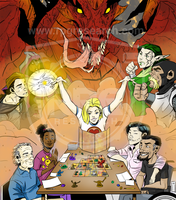Should You Mix Neuro/Psycho/Age Different Members in RPG Groups?
Q. "When running a group, do you keep the members to a certain diagnostic type of criteria (like for instance a group for social anxiety) or do you mix them up to a degree?"
A. "We mix as much as possible as safe and appropriate for the participants".
Much longer answer:
If you ask around at regular non-therapeutic groups, you will likely find that there is great diversity in the group. We often have rich demographics forms for participants to fill out, and the safe conclusion is that role-playing gamers pretty much come from "all walks of life" that have a reasonable amount of leisure time available.
From all walks of demographics, interests, ethnicities, cultures, education, ages, income, education, personality types, etc.
Many of the players will never be friends with the other players outside of gaming (though lifelong relationships through gaming can still develop), while others will find some great out of game friends.
It is one of the many intriguing and beautiful powers of RPG, with the role abstraction from the player, etc. that helps be that much more of an inclusive activity compared to many other recreational activities.
We mix folks whenever possible.
Sometimes based on their assessment and targeted goals, we may choose different strategic mixes.
Safety for all participants first. Sometimes it just is not appropriate to mix certain individuals with others (when we have the information to make such a discernment).
Developmental age can be a very important consideration. We don't usually mix 2-5 year old toddlers with 6-10 year old young children (depending on their current functional developmental levels) for some programs.
And some of the adolescents may be in a place functionally where mixing 5-12 year old children would be problematic for a slew of reasons (lets start with language, violence, and patience just to begin with).
For adult groups, more mixing usually takes place, anywhere from around 20 to 80+ years old, it is much more about their individual functioning and goals than any numeric value to their age.
While there may be some interesting cohort differences between the generations, those can be some powerful opportunities for deriving benefits from sharing cross-generationally.
As far as diagnoses, as long as there aren't specific risk/trigger factors between a mix, we hope for as much neuro/psycho diversity as possible.
That being said, some programs are very targeted to specific needs, for example learning to use the public transit system, or civic resources, so that is much more based on needs assessment than anything else.
With trauma clients, a lot of important considerations need to be taken into account on a case by case basis.
We do not mix victims and perpetrators.
Even the incarcerated populations are diverse in that their backgrounds and can vary wildly, though their immediate circumstances are the same, which can help camaraderie, but could have other issues to watch out for (rival gangs, etc.).
Not counting incarcerated, we have had players with decades-old animosity toward each other (they physical beat each other up back in high school), play in the same group, and their PCs became the most effective duo of the group. They never became friends in real life (IRL), but they recognized each others abilities (grudgingly) and in-game intentionally made their PCs best friends in the game, effectively like The One Ring RPG's Fellowship Focus, think something along the lines like Gimli & Legolas from J.R.R. Tolkien's The Lord of the Rings. :)
If folks are lower scoring on intelligence scores, such as below 80, or other significant impairments from brain injuries or other developmental challenges, we are careful to have a mix of players that are willing to be more patient and understanding in waiting for different populations to take the time they need to make difficult in-game decisions, speaking, picking up the dice, perform calculations, etc., and are patient enough to not try to be overly "helpful" to them (impatiently calling out the totals, etc.).
Basically, mix whenever it is safe to do so, often everyone benefits from the diversity!
Reference
Original FB Post: https://www.facebook.com/groups/637511693089807/1194578947383076/?comment_id=1194638067377164¬if_id=1555003180727813¬if_t=group_comment_follow&ref=notif
When running a group, do you keep the members to a certain diagnostic type of criteria (like for instance a group for social anxiety) or do you mix them up to a degree? At this point with where I am planning wise, I am considering kids on the higher end of the ASD with some social problems as well as kids with social/generalized anxiety. Just wanted some feedback on what you guys do though.
Another question to add on to then. Do you keep the group together as a closed group and when everyone has hit their goal the group is done or do you have more of a flow of when one person has hit their goal then their character "completes their mission" or whatever and they are dismissed from the group to allow a new client in?
Document Actions

